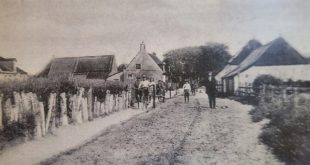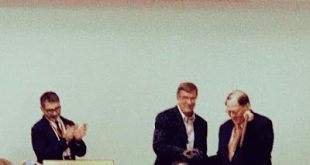There is no ‘tragedy of the Commons.’ But a tragedy of the absence of Commons-as organizations, let’s call it ‘the tragedy of uncommons’, does exist. Below, I will provide the example of the island of Ameland in the Northern Netherlands, in line with the historical examples of successful Commons mentioned by Elinor Ostrom (especially those for Switzerland). Ownership is a multi-dimensional concept. Up to the 1795 revolution, the island of Ameland, north of Friesland, was not a part...
Read More »The 9th principle. Meticulous administration.
No Christmas celebration on this blog this year. But a story about communities: the Commons of Buren and Hollum on the Waddensea island of Ameland. Commons have been studied by Elenor Ostrom. Studying Commons is of prime importance: we only have one earth. Reading Ostrom makes one optimistic. One of the things she mentions is the age of commons. Often, they survived centuries. Commons, which invariably voluntarily set limits on the use of resources, are sustainable. The Ameland Commons...
Read More »From Regulation to Deregulation and (Perhaps) Back (Talk in Portuguese)
[embedded content]My talk at the Federal University of Rio de Janeiro yesterday, on the rise, fall, and perhaps rise again of the regulatory state in the US, and its relation to ideas, particularly institutionalist, and Chicago School views, as expressed by John R. Commons and George Stigler. In Portuguese, of course.
Read More »Musicians Algorithmically Generate Every Possible Melody, Release Them to Public Domain Samantha—Cole
Damien Riehl and Noah Rubin generated and saved every possible melody to a hard drive, then turned it back around to the commons. ViceMusicians Algorithmically Generate Every Possible Melody, Release Them to Public Domain Samantha Cole
Read More »James K. Galbraith’s Veblen-Commons award
Ritual and prestige among the Institutionalists Jamie got the Veblen-Commons award, something his father received back in 1976. I introduced him, and as expected discussed a bit his contributions to economics, and the understanding of institutions. His most important contributions are on the field of inequality, and the work he has done with the University of Texas Inequality Project (UTIP).There are many contributions that Jamie and UTIP have made. His use of the UNIDO payroll data,...
Read More »Craig Murray — Nationalisation Without Compensation
What the Labour Party should be going for?What Craig Murray is addressing, without being explicit about it, is the theory of natural property rights based on John Locke's just-so story about mixing labor with land to acquire a natural right through use. This is based on a narrative that is unhistorical, on one hand, and on the other, it doesn't justify transfer, especially through inheritance. Marx gave the correct historical account based on "primitive accumulation," which amounts to...
Read More »David Sloan Wilson — How to Construct a New Invisible Hand: A Conversation with Peter Barnes
In a previous essay, I announced a new concept of the invisible hand to replace the old and erroneous idea that the pursuit of self-interest robustly benefits the common good. The new version is based on examples of the invisible hand that exist in nature, such as cells that benefit multi-cellular organisms and social insects that benefit their colonies. These lower-level units don’t have the welfare of the higher-level units in mind. They don’t even have minds in the human sense of the...
Read More »Oleg Komlik — The Goose and the Common — The Privatization of Public Space
An anonymous 18th century poem on enclosure of the commons. The result was the real tragedy of the commons for most people.Economic Sociology and Political EconomyThe Goose and the Common — The Privatization of Public SpaceOleg Komlik | founder and editor-in-chief of the ES/PE, Chairman of the Junior Sociologists Network at the International Sociological Association, a PhD Candidate in Economic Sociology in the Department of Sociology and Anthropology at Ben-Gurion University, and a...
Read More »David F. Ruccio — The goose and the commons
Enclosure of the commons, aka "primary accumulation" and "privatization of state property," that is, public goods.Occasional Links & CommentaryThe goose and the commonsDavid F. Ruccio | Professor of Economics, University of Notre Dame
Read More » Heterodox
Heterodox



